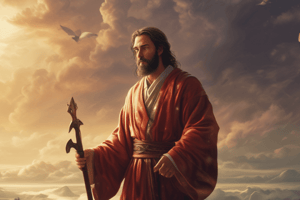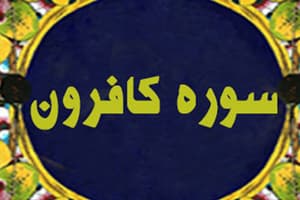Podcast
Questions and Answers
What is the origin of the word 'idolatry'?
What is the origin of the word 'idolatry'?
- From the Greek root 'eidolon' or 'image, figure' (correct)
- From the Greek root 'idolos' or 'image'
- From the Latin root 'idolum' or 'worship'
- From the Arabic term 'shirk' or 'polytheism'
What was the primary purpose of worshipping idols in Hinduism?
What was the primary purpose of worshipping idols in Hinduism?
- To gain wealth and material prosperity
- To achieve Moksha or reunion of the soul with Brahman (correct)
- To appease the gods and avoid punishment
- To show respect to the deceased ancestors
Which of the following is NOT a characteristic of Brahma, the Creator god?
Which of the following is NOT a characteristic of Brahma, the Creator god?
- Wielding a Padma (lotus)
- Representing the four Vedas
- Having four heads
- Being blue-coloured (correct)
What is the significance of the crescent moon on Shiva's head?
What is the significance of the crescent moon on Shiva's head?
What is the name of the three most famous idols worshipped by the Arabs in the pre-Islamic period?
What is the name of the three most famous idols worshipped by the Arabs in the pre-Islamic period?
What is the term used to describe the reunion of the soul with Brahman in Hinduism?
What is the term used to describe the reunion of the soul with Brahman in Hinduism?
What is the description of Vishnu, the Preserver god?
What is the description of Vishnu, the Preserver god?
What is the name of the three main manifestations of Brahman in Hinduism?
What is the name of the three main manifestations of Brahman in Hinduism?
What is the meaning of the Greek word 'polutheon'?
What is the meaning of the Greek word 'polutheon'?
In polytheism, what is typically believed to be possessed by each divinity or spirit?
In polytheism, what is typically believed to be possessed by each divinity or spirit?
What is the significance of a particular animal or natural phenomenon in polytheism?
What is the significance of a particular animal or natural phenomenon in polytheism?
What is a characteristic of devotion in polytheism?
What is a characteristic of devotion in polytheism?
What is the belief of Sikhs regarding God's existence?
What is the belief of Sikhs regarding God's existence?
What is the ultimate name of God in Sikhism?
What is the ultimate name of God in Sikhism?
How do Sikhs seek God?
How do Sikhs seek God?
What is Sikhism categorized as?
What is Sikhism categorized as?
Flashcards are hidden until you start studying
Study Notes
Idolatry
- Idolatry is the adoration and worship of idols (earthly and supernatural beings) as representations of God.
- Idolatry is derived from the Greek root eidolon or image, figure.
- It involves excessive reverence, respect or worshipping someone (saints, prophets, heroes) or something (idols, statues, images) other than God.
Idolatry in Pre-Islamic Period
- During the pre-Islamic period, the Arabs worshipped several idols, carved from various materials.
- Three of the most famous idols were Lāt, Manāt and ’Uzza.
Idolatry in Hinduism
- Idol worship is a main part of Hindu practice.
- Worshipping idols helps a devotee to connect with Brahman (the ultimate soul).
- Idols are not worshipped as stone or wood, but as a manifestation of Brahman in the form of a devata (deity).
- The major manifestation of Brahman is Trimurti, consisting of Brahma, Vishnu, and Shiva.
- Brahma, the Creator god, has four heads representing the four Vedas, four epochs of time, and four Varnas (classes).
- Vishnu, the Preserver god, is blue-coloured, four-armed, and holds a Padma (lotus), Gada (mace), Shankha (conch), and Chakra (wheel).
- Shiva, the destroyer god, is depicted as a strong and handsome man, deeply immersed in meditation or dancing, wearing a crescent moon on his head.
Polytheism
- Polytheism is the worship of multiple divinities, such as gods, goddesses, semi-divine beings, good or evil spirits, and spirits of departed ancestors.
- Each divinity or spirit is believed to possess a specific function, range of power, or control over a realm or human personality traits.
- Each entity is thought to embody a particular human or animal form or a blend of both, serving as its primary means of communication with humans.
Sikhism
- Sikhs believe that God is the creator and sustainer of the universe, and is both transcendent and immanent in all his creation.
- God pervades and dwells in his creatures, and can be found inside one's own heart through proper techniques and state of mind.
- The ultimate names of God are Sat Nam (the True Name) and Waheguru (Wonderful Lord).
- Sikhism is categorized as pantheism, as God is considered to be within his creations, and creations are within God.
Studying That Suits You
Use AI to generate personalized quizzes and flashcards to suit your learning preferences.




